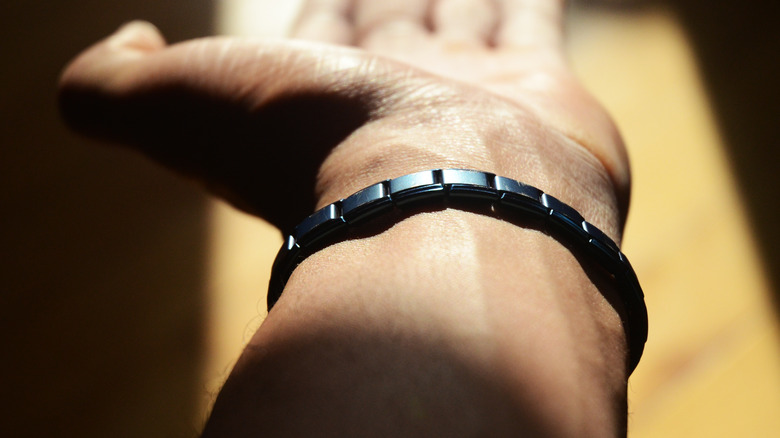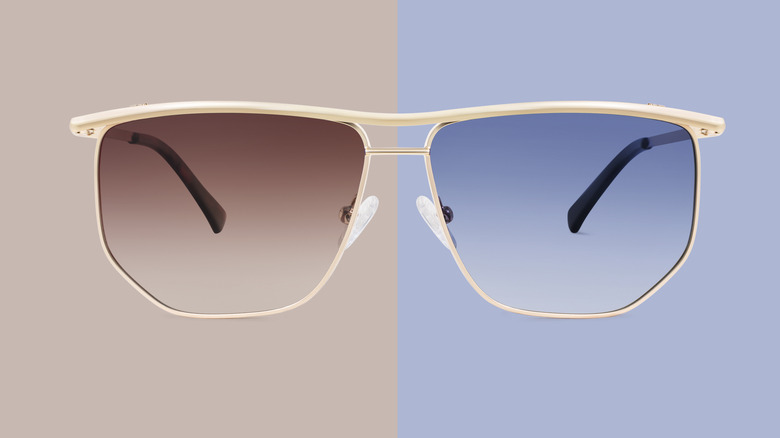The Biggest Weight Loss Scams Of All Time
Chasing after one's dream body can be considered a universal experience. And for many, achieving their dream body involves losing weight. In fact, according to a study with participants from over 30 countries, more than 45% of the global population is actively trying to lose weight.
Losing weight is no small task. Finding time to exercise and eat clean while balancing one's daily life can prove to be a real challenge. Perhaps this is why it's easy to fall prey to any and all methods and products that guarantee overnight weight loss.
Unfortunately, weight loss scams have been around for about as long as humanity's desire to lose weight. With an abundance of diet pills, weight loss teas, and "slim suits" at our disposal, it can be hard to know what to trust. While these products may seem enticing, if their claims sound too good to be true, it's because they probably are. Here's a list of some of the biggest weight loss scams of all time.
Detox teas
You've probably seen the celebrity-endorsed detox teas making their rounds on social media, along with the promise that drinking them can give you a flat stomach (via Healthline). While popular beverages like green tea or ginger tea are a good way to secrete toxins and cleanse your system, they are not the huge weight loss solution that they are marketed to be.
A primary ingredient in many of these weight loss teas is caffeine, according to WebMD, which acts as a natural diuretic that rids your body of waste by making you urinate more often. Similar to laxatives, consumption of detox teas can help you lose water weight.
However, this will neither keep the weight off over time nor help you lose any body fat. In fact, overconsumption of detox teas can dehydrate you and damage your gastrointestinal function (per Ro). With detox teas not being FDA-approved as well as their potential risks, it's not a good idea to rely on them to achieve your weight loss goals.
Body wraps and sauna suit
Imagine if all you had to do to lose weight was to wear a sauna suit or a tight wrap around the parts of your body that you want to alter. This may sound ideal, but in reality, any unwanted pounds that instantly melt away with this technique will just be gone temporarily (via WebMD).
Body wraps typically resemble waist trainers and work by wrapping around your midsection and cinching in your stomach temporarily, according to Healthline. On the other hand, sauna suits are akin to full body sweat suits or tracksuits. These "slim suits" and body wraps work by trapping in your body heat, causing you to sweat excessively. While this can result in the immediate loss of water weight, that weight is likely to creep back as soon as you drink some water to replenish yourself.
Both products are often worn while exercising, with the intent of detoxifying and inducing the body to sweat (via azcentral). However, research published in the journal Temperature shows that restrictive heat loss attire can actually prove to be quite dangerous, often leading to dehydration and even cardiovascular strain. Long story short, the weight loss benefits of these techniques are just temporary, and come with significant risks.
Weight loss patches
Weight loss patches look and act exactly how they sound: like large adhesive patches that supposedly promote weight loss (via Ro). The patches are a relatively new product in the diet industry that have quickly become a popular trend. With a blend of active ingredients like green tea, coffee extract, and mint, these diet patches promise to burn fat and slim the targeted areas in which they are applied to. So, what's the problem with them?
For starters, these products remain unapproved by the FDA due to a lack of evidence on their effectiveness, as well as the potential dangers of using them, according to Medical News Today. Some patches include the ingredient ephedra, which was banned as a supplement by the FDA in 2004 due to the serious health risks including heart attack, seizures, and stroke (per the Office of Dietary Supplements).
While people remain optimistic about the ingredients in the patches, "from a physiological staindpoint, a single ingredient (and in such small, sporadic amounts) simply can't have an impactful effect on body fat and metabolism," said weight loss physician Charlie Seltzer in an interview with Women's Health.
Fat burner supplements
Perhaps the biggest scam in the weight loss industry that continues to thrive are fat burner pills containing questionable ingredients that can be detrimental to your health. These dietary supplement pills claim to block the body's absorption of fat, according to WebMD. For people in search of a quick way to reduce fat, the idea of fat burner pills seems like a no-brainer, right? Unfortunately, fat burner supplements are more complex than they appear.
In theory, fat burner pills work to achieve weight loss by increasing your metabolism and curbing your appetite, according to the Cleveland Clinic. However, the ingredients, which include protein, can actually end up backfiring on you if too much is consumed. For starters, it is hard for the body to break down protein, which can in turn lead to weight gain (via Healthline). The pills also contain caffeine, which can cause jitteriness, insomnia, and an increased heart rate (via Mayo Clinic). And since these supplements are unregulated by the FDA, their overall effectiveness seems to be up in the air (per Cleveland Clinic).
Starch blockers
While starches make up an important part of our daily diet, many foods high in starch provide little in terms of nutrition, according to SFGate. This means that beloved foods like pasta, pizza, and cookies provide only carbohydrates and empty calories. And overindulging in carbs is typically followed by weight gain, as Scientific American explains. Unsurprisingly, blockers that interfere with carb digestion can seem like a tempting fix. However, it's important to be cautious of these pills.
Research on a strong starch blocker (via the American Journal of Gastroenterology) revealed that it only prevented 7% of carbs from being absorbed. In fact, many warning letters have been sent out in the past by the FDA to no-prescription starch blocker manufacturers for false advertising (per WebMD). And if that wasn't enough, some of the known side effects that come with usage of these starch blockers include bloating, diarrhea, and several other gastrointestinal issues.
HCG products
Non-prescription human chorionic gonadotropin (hCG) has been marketed as a miracle weight loss product that can help users shed up to a pound per day (via the FDA). However, the hormone, which can be purchased as shots, oral drops, or sprays, must be accompanied by a 500-calorie-per-day diet. This extreme caloric restriction has prompted the FDA to issue warnings against all commercially available weight loss products containing HCG (via Women's Health Research Institute).
In addition to the severely limited diet that HCG products call for, the products have also been marketed as a way to "reset [one's] metabolism" and adjust unhealthy eating patterns within the span of a month (per the FDA), despite the existence of very little scientific evidence to back up such claims.
Moreover, HCG is commonly used to treat fertility problems, and "is not approved for over-the-counter use" (via Mayo Clinic). Lastly, research suggests that there may be a link between the use of products containing the hormone and an increased risk for certain cancers.
Ab Glider
Marketed as a fast solution for people who desire six-pack abs but have limited time for physical activity, the Ab Glider seems fairly easy to use at first glance (per Weight Management Experts). It makes use of two simple motions (the circular burn and the arc burn) which are supposed to rapidly burn calories and engage the abs and obliques. The product quickly grew in popularity, and was even featured on TV shows such as "The View."
However, the Ab Glider has become the subject of legal scrutiny in 2014. As it turns out, its manufacturers weren't completely truthful or clear about the actual results that their product could deliver. An investigation revealed that none of the people featured in the Ab Glider commercials across various media platforms actually lost weight by using the product for just three minutes as advertised, according to the Consumerist. In reality, they had to followed a strict diet to achieve those results. Thus, the makers had to pay $3 million in civil penalties for deceptive ads and weight loss claims, per the Federal Trade Commission.
Magnetic jewelry
Various kinds of magnetic rings, earrings, and bracelets have been marketed as tools for increasing one's metabolism and losing weight. However, there's no scientific evidence or research to back up their supposed effectiveness (via Green Balanced Gal).
Apparently, the magnets in these jewelry items are falsely marketed to "increase your metabolism through the north pole of the magnet," according to Michelle Cardel, assistant professor at the University of Florida College of Medicine in Gainesville (via Livestrong). This gives the impression that if you have these trinkets, you can burn more calories throughout the day — whether you're resting or working out — and lose weight as a result.
Per the Federal Trade Commission, consumers should be wary of marketing promises involving instantaneous weight loss. In fact, any manufacturer claiming that people can safely lose more than a pound a week with their products is almost certainly lying. Thus, it's a good idea to regard magnetic jewelry as decorative pieces and nothing more.
Vision-Dieter glasses
Perhaps one of the strangest weight loss scams in history, the Vision-Dieter glasses came with a brown-colored lens in one eye and a blue-colored lens in the other, and promised to reduce the wearer's appetite by tricking their subconscious (via Weird Universe). This peculiar piece of eyewear was invented by optometrist John D. Miller in the 1970s, eventually entering the market with a $19.95 price tag, according to Quackwatch. Per the instructions, the glasses were to be worn every morning and afternoon — but oddly enough, not during meals — in order to curb the wearer's hunger.
Miller developed the glasses based on consumer psychology, following the belief that certain food colors attracted shoppers more than others. He used this theory to justify that consumers could also control their appetite through color-altering glasses that made foods less appetizing. However, the glasses left the market just as quickly as they hit, due to the FDA removing them for a lack of evidence of effectiveness, per Business Insider.
On an interesting note, in 2012, Japanese researchers developed blue-tinted "diet glasses" to trick people into eating less (via Phys.org). The key difference between that and the Vision-Dieter glasses? Study findings suggest that the newer, high-tech goggles actually worked.
Tapeworm diet
Yes, there is such a thing as a tapeworm diet. In fact, the parasite was once all the rage among Victorian women in the early 1900s seeking to shed a few pounds (via Atlas Obscura). While the idea may seem archaic — and moreover, just plain icky — it has still managed to crawl into modern-day dieters' mouths, albeit in a different form.
This time, instead of a live tapeworm, consumers swallow a pill with a tapeworm egg inside (per Healthline). The idea is that the parasite egg will hatch and from then on, continue to live in your digestive tract while subsisting on the food that you consume, theoretically sparing you from excess calories and prompting you to lose weight.
If the tapeworm diet sounds dangerous and risky, that's because it absolutely is. The FDA has banned these pils due to their dangerous side effects, including blockage and disruption in the function of major organs like the liver and lungs. Besides, the tapeworm diet offers no guarantee that any weight you lose won't just come back. This may seem obvious, but instead of putting a parasite in your body, stick to traditional, safer, and proven weight loss methods instead.
Warning signs of a weight loss scam
It's common knowledge that exercise and dieting are typically necessary not just for losing undesired pounds, but also for keeping them off. In other words, any product that promises instant results or weight loss without any exercise or dieting is probably too good to be true (via Fraud Guides). Many of these so-called miracle products share the same characteristics (e.g., advertising testimonials and reviews over scientific research, emotional appeals, overpromising), according to Men's Health.
In addition, aside from any weight loss that occurs alongside popular products or diet fads, it is important to consider exactly what you are losing. The difference between weight loss and fat loss is that many fad diets help you quickly shed water weight, causing the number on the scale to go down, per Burn Boot Camp. However, this is temporary, and won't yield the same healthy body or long-term benefits that come with actual fat loss.
As a general rule, make sure to thoroughly look into any weight loss product you're thinking of purchasing — and more importantly, don't rely on it to make up for unhealthy eating habits or lack of exercise (via Federal Trade Commission).
How to lose weight properly
When it comes to losing weight, there is sadly no shortcut. Instead of chasing trendy weight loss products or other things that aren't helping you lose weight, invest time and energy into a healthy lifestyle.
First and foremost, set realistic goals for your weight loss journey to ensure that you're safely losing a healthy amount of weight. For instance, Mayo Clinic recommends starting by burning 500 to 1,000 calories more than your daily caloric consumption. You can accomplish this by cutting back on refined carbs and sugars, and adding fresh vegetables, protein, and healthy fats (like nuts and avocados) to your daily diet (via Healthline).
Physical exercise is another great way to shed some weight. Some proven exercises for weight loss include running, kickboxing, and strength training (per Prevention). It can also be a good idea to consult your physician or nutritionist and come up with an effective diet and exercise plan. Lastly, remember that losing weight isn't linear, and that it's normal for your weight to fluctuate (via HelpGuide). Getting your dream body takes a lot of time, patience, and most important of all, a healthy lifestyle.













